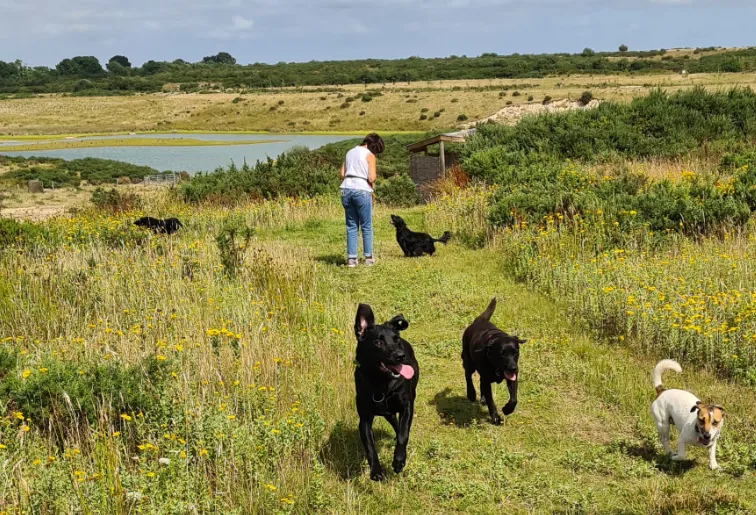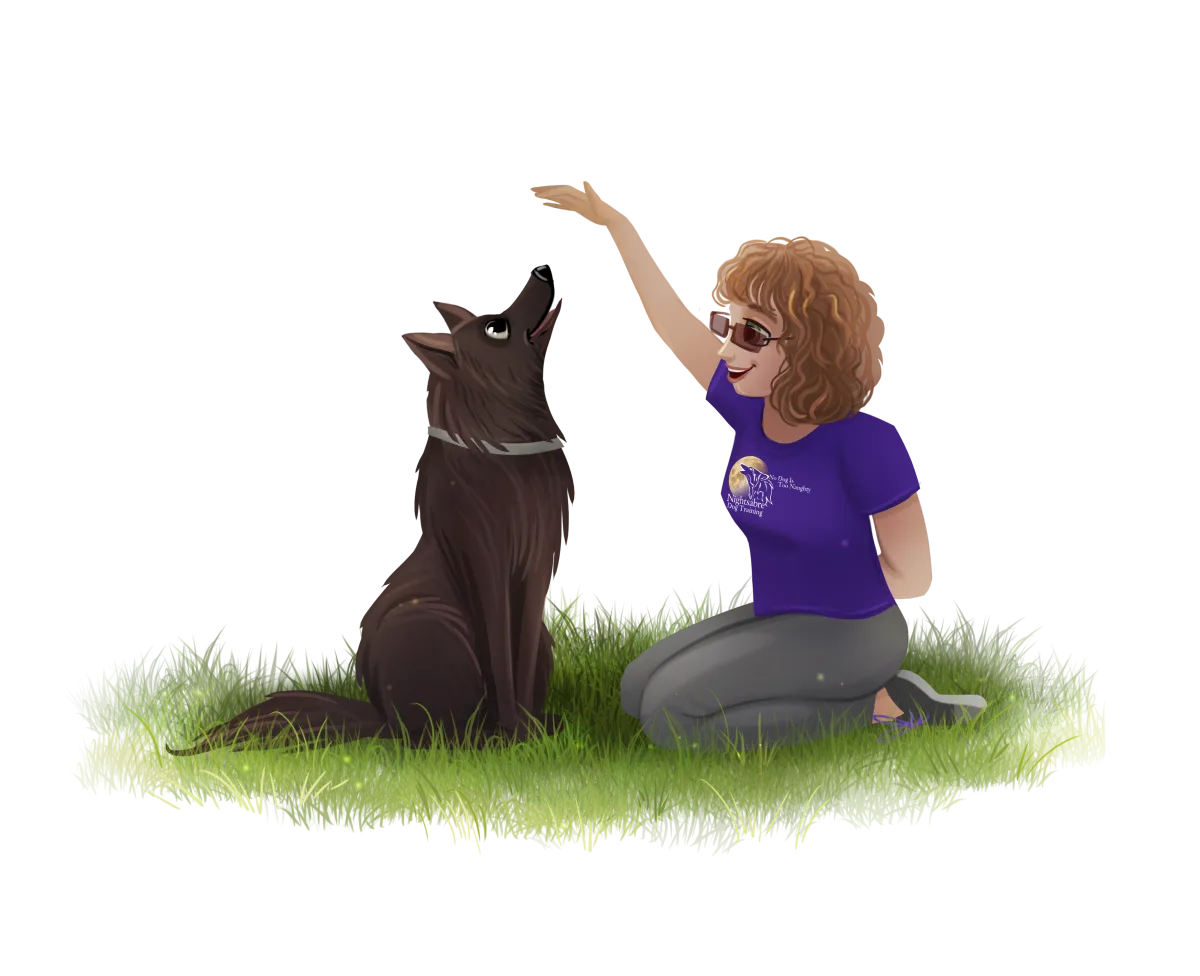The Fastest Way to Train a Dog: Positive Reinforcement Techniques for Success
Discover the fastest way to train your dog using positive reinforcement, with tips for obedience training stubborn breeds and using marker words effectively.
07888 870151

Discover the fastest way to train your dog using positive reinforcement, with tips for obedience training stubborn breeds and using marker words effectively.

Have you ever been in this scenario when walking your dog? You’re happily going about your business, and your dog is enjoying their walk just a few meters from you, when suddenly, a dog bounds towards you, full of excitement—and there’s no owner in sight! Or perhaps they’re just coming into the field, shouting, “It’s OK, my dog is friendly!”
For some of us, that’s great news, but for others, it sets off alarm bells.
A friendly dog is wonderful—until they’re not! Friendliness alone isn’t enough when we’re talking about off-lead control. Even the best-natured dogs can end up in situations that make other dogs, wildlife, or people feel uneasy. And let’s be honest—it’s not always a walk in the park for their owner either!
In this post, we’re going to take a look at why the “my dog is friendly” mindset falls short. We’ll explore common scenarios where friendliness just isn’t enough, the benefits of teaching dogs reliable manners, and how to help your friendly dog become a respectful, well-rounded companion—so they avoid becoming dog reactive as a result of running up to the wrong dog.

A dog’s friendliness is a wonderful quality that can brighten any day. But friendliness, without boundaries and respect, can sometimes cause stress or even lead to reactive behaviours down the line. Here’s why the “my dog is friendly” mindset often doesn’t account for the full picture:
Unexpected Reactions from Other Dogs: When friendly dogs approach every dog they see, they may eventually encounter one who reacts defensively. For example, a more sensitive or reactive dog may growl or snap as a way of saying, “Stay back!” This can shock a friendly dog, especially if they’re not used to these reactions, and can lead them to become fearful, anxious, or even reactive over time.
Repeated Boisterous Interactions: When a dog consistently approaches others without boundaries, they may unintentionally trigger fear or discomfort in less confident dogs. Over time, this can create a cycle where even a once-friendly dog becomes on edge, starting to anticipate defensive responses, and may respond in kind.
Creating Fear or Reactivity in Other Dogs: A boisterous approach, especially from a large or high-energy dog, can be intimidating for smaller or more sensitive dogs. When repeatedly exposed to these approaches, other dogs can develop their own reactive behaviours as a way to defend their space.
Impacting Training Progress for Other Dogs: Many dogs in public spaces are working on training or managing behavioural issues. A friendly dog approaching without permission can interrupt training and reinforce anxiety in dogs that are working on being calm and focused.
Key Point: A friendly dog with good boundaries respects other dogs’ space, enhancing positive interactions for everyone. This doesn’t mean they can’t socialise—it means they do so thoughtfully.
Letting a friendly dog off-lead without reliable recall can pose a range of safety risks, both for the dog and for others nearby. Off-lead control gives a dog the freedom to explore without the risk of putting themselves or others in harm’s way.
Traffic and Roads: A friendly dog that doesn’t respond to recall can easily dart toward roads, creating a risk for both themselves and passing vehicles.
Natural Hazards: From ponds to sharp objects, areas with hidden hazards are risky for dogs that may get too excited or curious without awareness of their surroundings. Without recall, owners often struggle to keep these dogs out of harm’s way.
Other Dogs’ Personal Space: Off-lead friendly dogs may wander too close to dogs that are reactive or prefer their own space. This can lead to confrontation, often leaving both dogs tense and on edge.
Wildlife Chasing: Friendly dogs may see wildlife as exciting playmates, but this behaviour can quickly turn dangerous. Not only can a dog get lost while chasing animals in unfamiliar areas, but they also risk road traffic accidents if the wildlife they’re chasing darts across a busy road. A dog in pursuit is unlikely to pause or recognise the dangers around them, which can result in serious consequences for both dog and wildlife.

Strain on the Dog-Owner Relationship
Another risk of letting dogs wander too freely is that they may run out of sight, putting a strain on the bond between dog and owner. When dogs run beyond the owner’s view, especially in open or wooded areas, it adds a layer of stress and unpredictability. And for the owner, the frustration of calling their dog back and being ignored is all too real, creating tension and, sometimes, a loss of trust in the dog’s ability to listen. Reliable recall is more than a convenience—it’s an essential part of building a safe, connected relationship with your dog.
Off-lead control keeps friendly dogs, other animals, and people safe, enhancing the quality of every outing.
True off-lead control isn’t just about recall—it’s about creating a well-rounded dog who’s respectful and responsive in all settings. Here’s how good manners and friendliness combine to create the ideal companion:
Reliable Recall Cues: A solid recall keeps your dog close, no matter what distractions they encounter. Regular practice, from quiet spaces to busy areas, builds up their responsiveness in all environments.
Reinforcing Boundaries with a Check-Back: Building “check-back” habits, where dogs regularly return to or make eye contact with their owner, makes it easier to navigate busy areas without worry.
Boundaries for Approaching: Teaching a friendly dog to approach others only when allowed by you builds good habits. For example, asking your dog to sit and wait for permission to approach another dog shows them that you’re guiding their interactions.
Polite Greetings: Friendly dogs who know to “wait” or “sit” before greeting others are more likely to approach politely, making interactions smoother and more enjoyable for everyone involved.
Rewarding Calm Behaviours: Reinforce calm behaviours like sitting, staying, or keeping close. Reward these behaviours with treats or play so your dog learns that being calm brings great outcomes.
Training on a Long Lead: Using a long lead while practising off-lead behaviours allows control and freedom to explore, helping a dog understand that their space is still within reach.
Friendly dogs with boundaries are able to enjoy their time off-lead safely and respectfully, making them great companions and easy for others to enjoy too.
Creating a well-rounded, friendly dog is rewarding for both of you, and the journey to off-lead confidence starts with some basics.
Using High-Value Treats and Toys: Recall should be exciting for your dog! Use their favourite treats or toys to encourage quick responses and consistent check-ins.
Frequent Practice in Varied Environments: Practising in different locations and gradually adding distractions makes recall second nature.
Establish Boundaries Early: Start by asking your dog to “sit” or “wait” before greeting other dogs or people. Reward them for staying calm before being allowed to greet.
Use the Long Lead: When working in public, a long lead gives a friendly dog freedom to move while still allowing you to guide their behaviour and keep control.
Introduce One Distraction at a Time: Start with mild distractions like another dog in the distance, then gradually work up to busier areas. Always reward your dog for focusing on you amidst these distractions.
Practice the Check-Back Game: A simple game that encourages your dog to look back at you when they see a distraction, reinforcing their habit of staying close and tuned in to you.
Key Point: Building manners isn’t about stifling your dog’s personality. It’s about creating a reliable and respectful companion who’s free to enjoy life’s adventures safely and with you at their side.
Building a Friendly, Well-Mannered Dog
A friendly dog is a true joy, but adding manners and recall to that friendliness makes them a well-rounded companion, trusted by other dogs, wildlife, and people alike. While friendliness is wonderful, combining it with solid recall and off-lead control keeps interactions safe and respectful, so every outing is a positive experience.
If you’re ready to build your dog’s manners and off-lead skills, our upcoming Rogues course offers training that will help you and your dog make the most of your time together. Give your friendly dog the skills they need to be both enjoyable and safe for everyone they meet.
Want to learn more about how I can help you with your dog? Book a free call today ring or text 07888 870151

Fun | Focus | Play® by Nightsabre Dog Training
Natasja Lewis DipCAPBT | 07888 870151 | [email protected]
Nightsabre Dog Training © 2023/2024/2025 . Privacy Policy